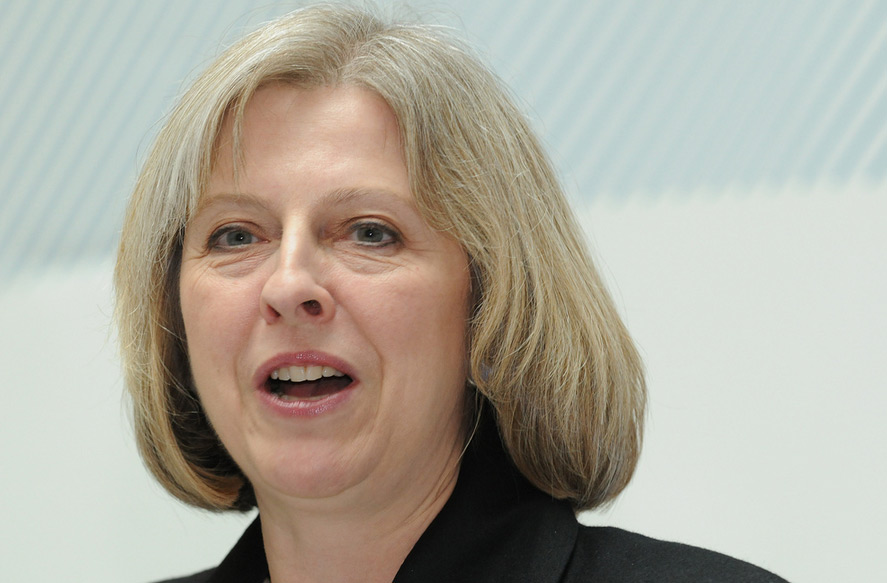Despite last year's Edward Snowden revelations kicking off big debates about government intrusion in the day to day lives of internet and telephone users the world over, the British government doesn't feel like it has enough eyes on its citizens. The Home Secretary, Theresa May, recently made a speech about how the dangers of terrorism mean we need to have more government surveillance.
While I've love to take her to task for using the terrorism buzzword for scaremongering purposes, in all fairness, the speech was her annual Lord Mayor's Defence and Security lecture and with the recent problems in Iraq, it's fair to say that terrorism was bound to come up.

However, her veiled threats that terrorists are in our back garden, certainly seemed more in-line with typical tabloid headline fear:
“The terrorist threats to this country and our interests are changing faster than at any time since 9/11. We continue to face possible attacks by al Qaida in Pakistan and Afghanistan,” she said. “They are on the doorstep on Europe, just a few hours flying time from London, and they want to attack us – not just in Syria or Iraq but here in Britain.”

Someone should point out to Miss May that in the 21st century, the whole world is only a few hours flight away.
She went on to discuss data collection in the past, suggesting that it was nothing to worry about as the government had always been doing it, but that now it was getting harder. Which is why it needs more power.
“It is much harder now – there is more data, we do not own it and we can no longer always obtain it,” she said. “I know some people will say ‘hurrah for that’ – but the result is that we are in danger of making the internet an ungoverned, ungovernable space, a safe haven for terrorism and criminality.”
She ended with a show of determination, stating that she and those that believed as she does – that government tracking and monitoring need to be stepped up – would never give up:
“Yes, we have to make sure that the capabilities can only be used with the right authorisation and with appropriate oversight. But this is quite simply a question of life and death, a matter of national security. We must keep on making the case until we get the changes we need.”
Understandably, many people completely disagree with May on the topic of privacy, government oversight and surveillance. Loz Kaye, leader of the Pirate Party UK commented that she was trying to once again bring about the “Snooper's Charter,” an invasive communications bill that was shot down in 2013 by dwindling support.
“Yet again Theresa May is trying to open the door to bring back the Snoopers' Charter. Despite her claiming it is ‘fictitious', we now know thanks to Snowden that the UK has an unprecedented ability to carry out mass surveillance,” he said. “What capabilities does the Home Secretary want over and above OpticNerve's interception of webcam images of people not suspected of any wrongdoing?”
He then went on to point out many of the individuals who had been tracked down using already available surveillance techniques. If the government was currently helpless, then why were they so easy to find?
“Theresa May suggests that the Internet is becoming an ungoverned place. That is obviously nonsense. Try telling that to Richard O'Dwyer, Paul Chambers or Peter Sunde. Far from protecting us, mass surveillance dismantles the very freedoms this government claims to be upholding. This is not abstract as she claims, it is a real danger for our democracy”.
KitGuru Says: Theresa May once again seems absolutely out of touch with the reality of being a citizen. Just as she ignored claims that banning Khet would do more harm than good because she was on the warpath, here again she shows disdain for personal privacy and a disinterest in listening to the people that helped put her in office. Perhaps if she'd had her phone hacked like German chancellor Angela Merkel and some of her personal information had been leaked, she might not be so excited by the prospect of more government intrusion.
 KitGuru KitGuru.net – Tech News | Hardware News | Hardware Reviews | IOS | Mobile | Gaming | Graphics Cards
KitGuru KitGuru.net – Tech News | Hardware News | Hardware Reviews | IOS | Mobile | Gaming | Graphics Cards



Can I be the first to say, No thanks?